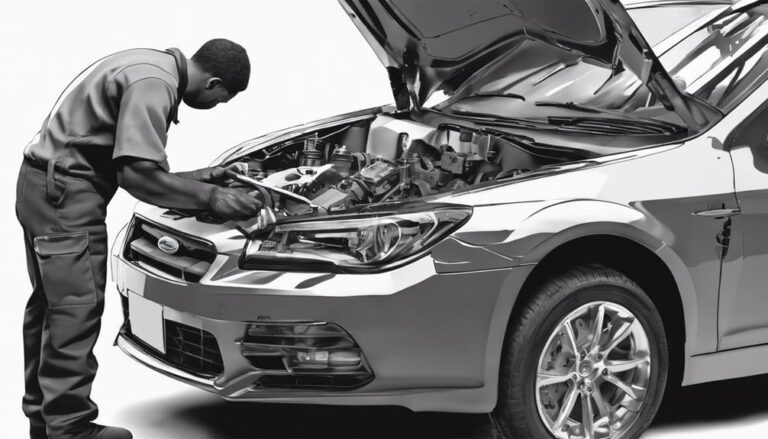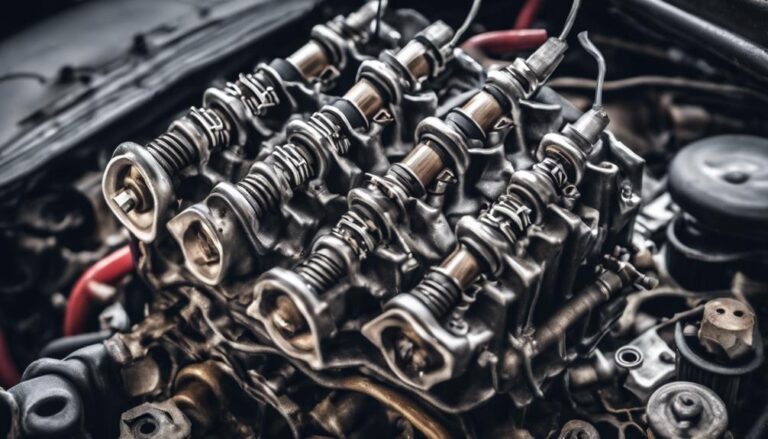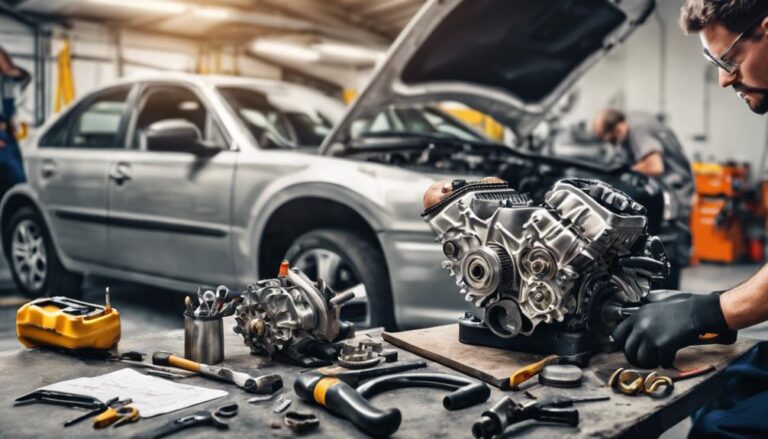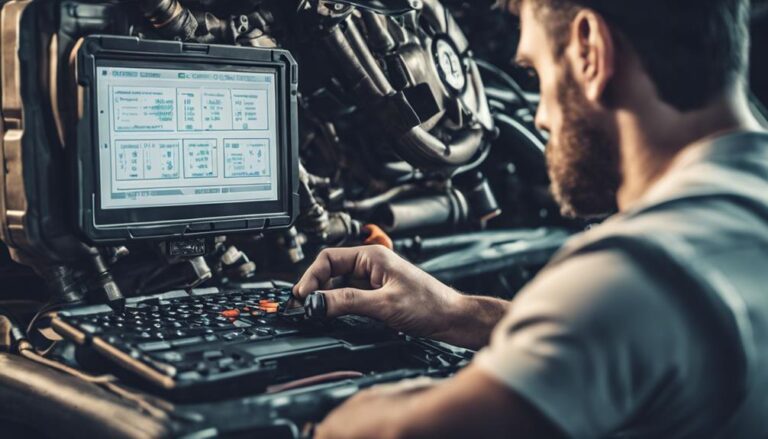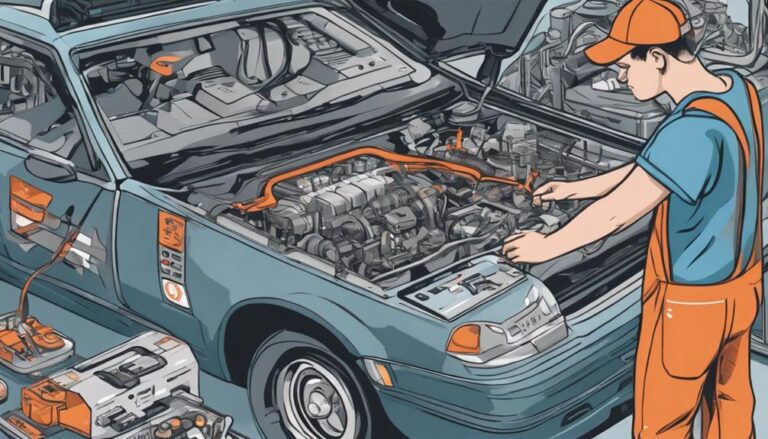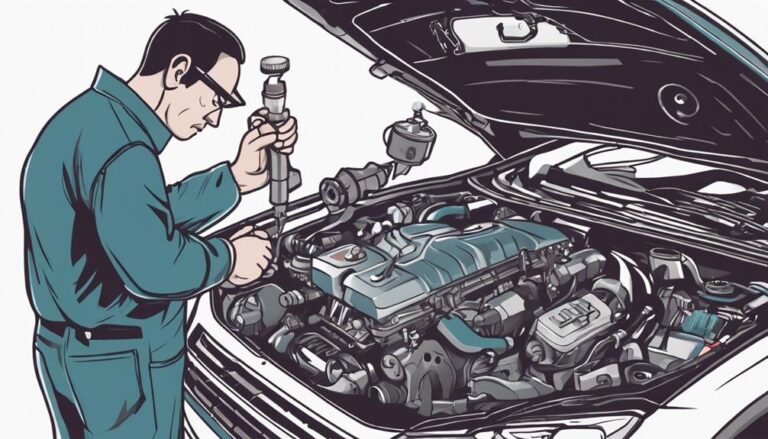7 Best Signs of a Failing Engine in Vehicles
When it comes to your vehicle, the engine serves as its beating heart, ensuring everything runs smoothly. But what happens when that heart starts to falter? Understanding the seven best signs of a failing engine can be crucial in maintaining your car's health and safety.
From subtle clues to glaring warnings, knowing how to spot these indicators early on could save you from a costly breakdown. So, let's explore the subtle hints your vehicle might be giving you and how to address them before it's too late.
Key Takeaways
- Check Engine Light and Loss of Power are crucial indicators of potential engine issues.
- Unusual engine noises like knocking, whining, or grinding signal underlying problems.
- Promptly address symptoms of impending engine failure to ensure longevity and safety.
- Regular maintenance, vigilance, and swift action prevent unexpected breakdowns and costly repairs.
Check Engine Light
When your vehicle's check engine light illuminates, it serves as a crucial indicator of potential issues within the engine system, ranging from minor fuel-related concerns to critical engine malfunctions.
Common causes for the check engine light to come on include a loose or damaged fuel cap, faulty oxygen sensor, worn-out spark plugs, or a failing catalytic converter.
To accurately diagnose the specific problem triggering the check engine light, automotive technicians utilize diagnostic tools such as OBD-II scanners. These tools plug into a port located under the dashboard and provide error codes that point towards the root cause of the issue.
Understanding these codes is essential for determining the appropriate repairs needed to resolve the engine problem efficiently.
Loss of Power
Loss of power in a vehicle can be indicative of underlying issues affecting engine performance, potentially impacting acceleration and speed maintenance. When experiencing a decrease in power, it's essential to consider the following:
- Fuel Efficiency: A noticeable drop in power can lead to decreased fuel efficiency, causing the vehicle to consume more fuel to perform the same tasks.
- Acceleration Issues: Power loss can manifest in poor acceleration, making it challenging for the vehicle to pick up speed quickly or climb hills effectively.
- Engine Performance: Loss of power can result in a lack of engine responsiveness, affecting the overall performance of the vehicle.
- Safety Concerns: Reduced power can compromise the vehicle's ability to respond promptly in critical situations, posing safety risks to the driver and passengers.
Recognizing these signs promptly and addressing them through diagnostic services can help maintain the engine's health and ensure safe and efficient vehicle operation.
Decreased Gas Mileage

Experiencing a decrease in gas mileage can serve as an early warning sign of potential engine inefficiencies or fuel system issues that require attention. When your vehicle's fuel efficiency drops suddenly, it could indicate underlying problems that need to be addressed promptly.
Issues with the fuel system, such as clogged fuel injectors or a malfunctioning oxygen sensor, can lead to decreased gas mileage. Inefficient engine components like worn-out spark plugs can also contribute to poor fuel economy. Regular maintenance of your vehicle's fuel system is crucial to ensure optimal performance.
Monitoring changes in gas mileage can help you identify and address engine performance issues early on. Additionally, your driving habits play a significant role in your vehicle's efficiency. Aggressive driving, excessive idling, and carrying heavy loads can all contribute to decreased gas mileage.
Unusual Engine Noises
When your vehicle's engine emits knocking sounds, it suggests potential issues with combustion timing or worn-out components.
Whining or squealing noises may indicate problems with belts or pulleys, affecting engine performance.
Rattling or grinding sounds could point towards loose parts or issues within the transmission system, requiring immediate attention to prevent further damage.
Engine Knocking Sounds
If you hear engine knocking sounds in your vehicle, it signals premature ignition of the air-fuel mixture, necessitating immediate attention to prevent potential severe engine damage. Here are some key points to consider:
- Diagnosing Causes:
- Determine if the knocking occurs at idle or under load.
- Check for incorrect fuel octane levels or carbon buildup.
- Preventative Measures:
- Use the recommended fuel grade for your vehicle.
- Ensure proper maintenance of the ignition system and timing.
Addressing engine knocking promptly can help avoid costly repairs and potential engine failure. Take action to diagnose and resolve these sounds to keep your engine running smoothly.
Whining or Squealing
Whining or squealing noises emanating from your vehicle's engine typically signify underlying issues with the belts or pulleys, indicating potential wear or misalignment in the engine components. Proper belt tension and pulley alignment are crucial for the smooth operation of your engine.
Regular engine belt and pulley maintenance can prevent these noises from occurring, ensuring the longevity of your vehicle's engine. Ignoring these sounds can lead to more severe damage, impacting the overall performance of your vehicle.
It's advisable to seek professional assistance to diagnose and address the source of these noises promptly. By addressing whining or squealing sounds early on, you can prevent potential engine failure and avoid costly repairs down the road.
Rattling or Grinding
Rattling or grinding noises coming from your vehicle's engine are indicative of potential internal damage, signaling issues with critical components such as pistons and bearings. When you hear these sounds, it's crucial to take action promptly to prevent further damage. Here are some key points to consider:
- Engine vibrations, potential causes: Excessive wear on engine parts can lead to vibrations, causing rattling or grinding noises.
- Engine overheating, warning signs: Overheating can put stress on engine components, leading to abnormal sounds. Keep an eye on temperature gauges and coolant levels.
Ignoring these noises can result in severe engine issues, leading to costly repairs or even engine failure.
Seek professional inspection to diagnose the exact source of the unusual engine sounds.
Engine Stalling
Engine stalling, a common indicator of potential fuel delivery issues affecting engine performance, demands immediate attention to prevent further complications and maintain vehicle reliability.
When your engine stalls at idle, it could point to underlying problems with fuel delivery, such as clogged injectors, a malfunctioning fuel pump, or poor fuel quality hindering proper combustion.
To address engine stalling, consider regular maintenance tips like ensuring clean fuel filters, using high-quality fuel, and scheduling professional inspections. Ignoring engine stalling may lead to more severe engine issues and costly repairs down the line.
Timely diagnosis and repair are crucial to rectifying stalling problems, safeguarding vehicle safety, and preserving engine longevity. By staying proactive and addressing engine stalling promptly, you can mitigate risks of engine failure and maintain optimal performance in your vehicle.
Engine Running With Ignition off

When facing the issue of the engine running with the ignition off, potential causes such as carbon buildup in the combustion chamber or faulty ignition components should be promptly investigated to prevent overheating and potential engine damage.
This anomalous behavior can stem from various factors like carbon deposits creating hot spots that continue to ignite fuel even after the engine shuts down or a malfunctioning ignition switch disrupting the engine's normal operations.
To address this problem effectively, consider the following:
- Check for carbon buildup in the combustion chamber.
- Inspect the ignition switch for any signs of malfunction.
- Evaluate the solenoid for proper functioning.
- Monitor the engine closely for any unusual noises or vibrations.
Taking swift action upon noticing the engine running with the ignition off is crucial to avoid further complications that could lead to severe engine issues. By diagnosing and addressing the root cause promptly, you can prevent potential damage and ensure the proper functioning of your vehicle's engine.
Signs of Impending Engine Failure
If you notice strange noises like metallic knocking or tapping, combined with a sudden decrease in engine power, your vehicle may be showing signs of impending engine failure. These symptoms often point towards serious internal damage that can lead to critical issues.
It's crucial to address these warning signs promptly to prevent further damage and ensure the longevity of your engine.
Strange Engine Noises
Unmistakable sounds emanating from your vehicle's motor may serve as crucial warnings of potential imminent engine issues that demand immediate attention.
- Knocking, hissing, or backfiring sounds can indicate problems in the combustion flow, signaling potential engine failure.
- Unusual noises upon starting the vehicle serve as warning signs of impending engine issues that require attention.
- Different engine noises like tapping or grinding can signify specific underlying problems that may lead to engine failure.
- Ignoring strange engine noises can result in severe engine damage and costly repairs down the line.
Decreased Engine Performance
A noticeable decline in engine performance can serve as a clear indicator of potential impending engine failure. Power loss, evidenced by the vehicle's decreased ability to move efficiently, is a key sign.
Unusual or excessive noise during engine operation may signal underlying issues leading to failure. Poor gas mileage indicates engine efficiency problems.
Engine stalling, particularly in automatic transmission vehicles, can warn of impending failure. Odd smells from the engine may point to serious internal issues.
To address engine performance issues, check for engine overheating problems and follow troubleshooting tips. Avoid common mistakes in engine performance tuning to prevent further deterioration.
Stay vigilant to ensure optimal engine health and prevent unexpected breakdowns.
Frequently Asked Questions
What Are the Signs of a Weak Car Engine?
If you notice reduced engine performance, warning lights illuminating, or unusual noises, seek immediate attention. Ignoring these signs can lead to costly repairs. Stay attentive to any changes in your vehicle's behavior to prevent engine failure.
What Are the Signs of Engine Damage?
If your engine shows signs of damage, don't hesitate to act. Engine smoke and strange noises are red flags that should prompt immediate attention. Ignoring these warnings could lead to costly repairs or even engine failure.
How Do I Know if I Have Engine Failure?
If you suspect engine failure, listen for engine knocking and check for smoke. Strange noises and sudden power loss are red flags. Act swiftly to prevent further damage. Ignoring these signs can lead to costly repairs.
How Do I Know if My Car Engine Is Ok?
If you're wondering about your car engine's health, regular maintenance tips and diagnostic tools are crucial. Pay attention to warning signs like odd noises, lights, mileage changes, stalling, or strange smells to catch issues early.
Conclusion
In conclusion, when you notice any of the 7 signs of a failing engine in your vehicle, it's crucial to address them promptly to avoid costly repairs and ensure optimal performance. Ignoring these warning signs can lead to severe engine issues that may leave you stranded on the side of the road.
Remember, taking care of your engine is like giving it a hug every day to keep it running smoothly – don't wait until it's too late!


